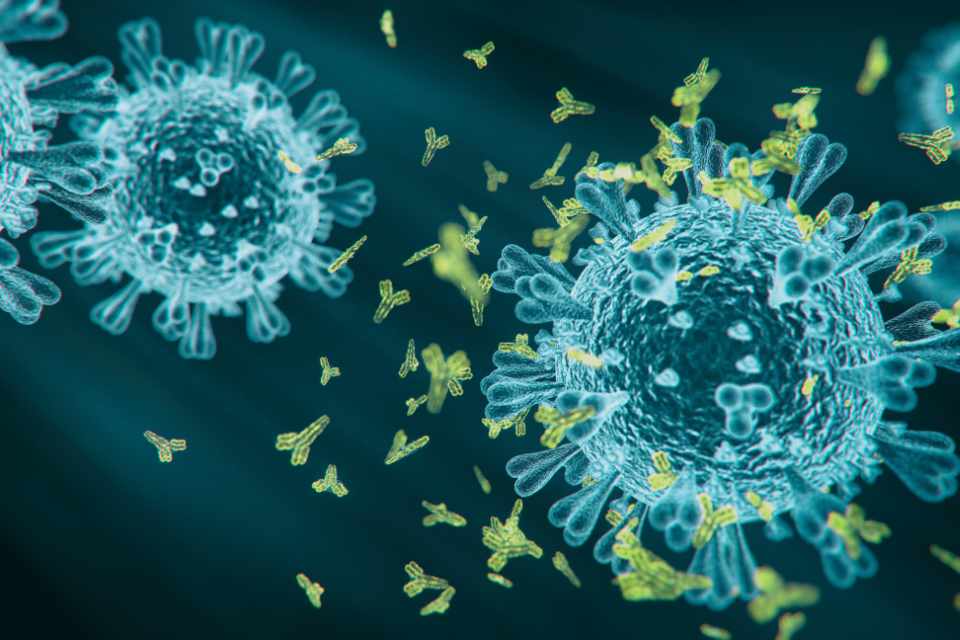Cold sores are the result of a very common and persistent infection caused by the herpes simplex virus. We recognise the infection as small blisters that usually occur on the lips or around the mouth. These blisters or sores can be painful, with burning or itching, and may last up to three weeks without treatment. Though the immune system can fight the virus it can not remove it from the body. So, once someone has the virus they have the infection for life. The virus can remain dormant in nerve cells until the immune system is off guard and then it reactivates, travels to the skin, lips or mouth and causes symptoms. Though most people never have a recurrence of cold sores after their initial infection, many people do. If you are one of these people read on for ways to stop cold sores coming back.
The immune system and the herpes simplex virus
The herpes simplex virus is a very successful human pathogen. Infecting at least 40% of the world’s population. It not only causes cold sores but is associated with many other diseases of the skin, eyes, genital and nervous system. Recently there has even been a suggested link to the development of Alzheimer’s disease. However, this may be difficult to prove since so many people have the herpes simplex virus.
The immune system has a vital role in removing the active infection and forcing the virus into dormancy. It has several means of doing this. Different components of the immune system can either block entry of the virus into cells. Or, block viral replication within cells. Or, block the virus from being shed from infected cells into the surrounding tissues.
Once the virus is dormant it is able to hide from the host immune system. Scientists recently discovered that the virus has found a way to prevent infected cells from signalling the immune system. So the virus is relatively protected and hidden within host cells. Your immune system is the best defence against a cold sore outbreak. Supporting healthy immunity helps prevent reactivation of the virus. There are natural remedies that can provide support.
Cold sores and anti-viral medications
Since the 1970s antiviral drugs such as acyclovir have been available and prescribed to treat herpes simplex infections. These are usually taken in the short term to help clear up an outbreak. Though some people with recurrent infections may find that they need to take these medications constantly in order to prevent outbreaks of cold sores. Unfortunately there are now strains of herpes simplex that are resistant to these medications which makes recurrent cold sores more likely. If you find that your medication is not helping any more, there are some proven natural remedies that you can try.
Using natural remedies for cold sores is nothing new. After all people had cold sores long before antiviral drugs were developed. So there is a long tradition of using herbal remedies for viral infections, including herpes. Plus, scientists have studied some of these herbal remedies and their findings often support the traditional use.
Diet and cold sores
Before we get on to the remedies – a word about diet and lifestyle. Anything that suppresses the immune system will likely make reactivation of the herpes virus more likely. So, make sure to get adequate sleep, manage your stress and keep refined sugars in the diet to an absolute minimum to lower your risk of a recurrence.
In addition, some people say that certain foods trigger their herpes outbreaks. It is certainly possible that a food sensitivity can strain the immune system and leave you susceptible to an outbreak. If you suspect that you have food sensitivities then it could be worth following an elimination diet for a month or two to help identify your trigger foods. It is also worth paying attention to the ratio of the amino acids lysine and arginine in your diet, but more on this later.
Natural ways to stop cold sores coming back
The lysine:arginine ratio
Lysine and arginine are amino acids. Amino acids are the chemical building blocks that make up proteins. With subtle differences in amino acid combinations making the difference between the final protein.
Scientists found that the amino acid arginine is needed for the herpes simplex virus to multiply itself. We also know that the amino acid lysine competes with arginine and reduces the amount of arginine absorbed by cells. It also increases arginine excretion from the body. So, by increasing the ratio of lysine to arginine in the diet, we can make it more difficult for the virus to replicate.
Lysine rich foods include animal proteins and legumes. Whilst grains and refined sugar are low in lysine.
The arginine rich foods are chocolate, nuts and seeds. Of course there is no harm in reducing chocolate, but nuts and seeds provide health benefits of their own. So, it is better to improve the lysine to arginine ratio by increasing lysine rich foods than reduce nuts and seeds.
Lysine is also destroyed by certain cooking methods. Avoiding dry cooking at high temperatures to preserve lysine in foods. So it is better to poach or boil than to grill or fry.
Lysine is also available as a supplement. In studies 300mg to 3000mg per day is often used. As we might expect, the effectiveness of reducing cold sores appears to increase with higher amounts of lysine. Studies usually last for several weeks, up to a year. Yet the optimal dose is still unknown and may depend on certain factors including how much lysine a person consumes in food. In my opinion it is probably better to eat lysine rich foods than to supplement, especially in the longer term.
A study published in 2017 investigated the effect of another amino acid, glutamine, in mice and guinea pigs. It showed that glutamine supplementation reduced reactivation of herpes simplex in these animals. Researchers suggested that this might be due to enhanced immune system function caused by glutamine supplementation.
Zinc
Topical zinc preparations such as zinc sulphate solution may provide relief from cold sore symptoms of pain, burning and itching. Daily applications of very dilute solutions helped to heal cold sore lesions and prevented recurrence.
Daily supplementation of 50mg zinc sulphate in combination with magnesium and B-vitamins reduced the frequency of cold sore outbreaks outbreaks. And, a similar study of zinc in combination with vitamin C reduced the duration and severity of symptoms.
One problem with zinc supplementation at this level, is that this trace element needs to be kept in balance with another trace element in the body, copper. Long term supplementation of zinc, especially in high doses, can upset the zinc:copper ratio, and cause a copper deficiency in the body.
Vitamins
Vitamin C is known to support immune system function. In studies it deactivates many viruses, including herpes simplex in vitro. Vitamin C also accelerates the healing of cold sore lesions. This vitamin may be more effective when taken alongside the bioflavonoids that occur naturally with vitamin C in foods such as citrus fruits.
In this study, a combination product containing 50mg of pine cone extract and 50mg ascorbic acid (vitamin C), three times a day before meals, for one month. Researchers reported that the majority of those taking the combination product had a reduction in the severity of symptoms. As well as a reduction on the recurrence of cold sores.
Vitamin E is an antioxidant vitamin that is known to strengthen the immune system. It can be used topically directly on cold sore lesions to relieve pain and speed up healing. Repeated applications of vitamin E oil from a capsule, every 4 hours, may provide more rapid healing and sustained relief.
Botanicals
Leaf of Lemon balm, or Melissa officinalis, is a herbal remedy that has been used traditionally for reducing recurrence of cold sores. Typically lemon balm cream is applied several times a day for 5 to 10 days.
In this study lemon balm extract interacted directly with herpes simplex virus. The extract showed antiviral activity, even towards acyclovir resistant strains, preventing their attachment to host cells in vitro. Therefore, lemon balm may be an effective way to limit the ability of herpes simplex to penetrate host cells.
The African geranium, Pelargonium sidoides, is a herb used in traditional South African medicine. This study describes how this herbal remedy inhibits herpes simplex virus and researchers suggest that it may prove suitable as a topical therapy for herpes infections.
Licorice root, Glycyrrhiza glabra, is a herbal medicine that is widely used for its antiviral properties. In this study a licorice extract was shown to be effective against herpes simplex virus. Researchers suggest its anti-herpes activity may be due a number of mechanisms. Such as an ability to prevent attachment of the virus to the cell. Or a direct inactivation of the virus in vitro. Care is needed when using licorice as the remedy may increase blood pressure in some people.
Herbal remedies contain a complex mixture of active medicinal constituents. It is their complexity that likely makes them effective against disease causing pathogenic organisms. Since active constituents often affect pathogens via different mechanisms. A pathogen may be able to respond to and become resistant to a single mechanism of action, but when a remedy affects a pathogen via several pathways, the pathogen is very much less able to respond. In a similar way, using several medicinal plants or natural remedies together is likely to be more effective than using individual remedies. Several herbal remedies together could contain hundreds of medicinally active constituents. The efficacy of the whole being greater than the sum of the parts, is often a principle underlying the wisdom of traditional herbal medicine.
You might also like:
How to boost your immune system with shiitake mushrooms
Food allergy and food intolerance – a quick guide








0 Comments